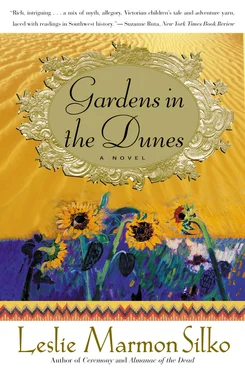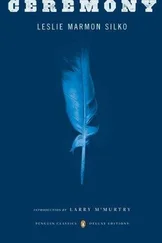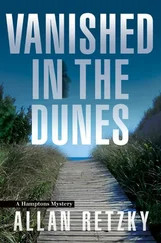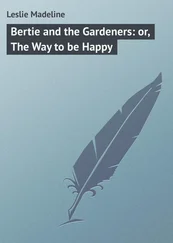One night two weeks after their arrival in Portal, the sound of gunshots woke Edward. Heart pounding, he held his breath and listened for more gunfire and for the sounds he imagined at the massacre and burning of old Portal; but he heard only the hum of the jungle. The next morning the cantina and stores were strangely deserted and the hurdy-gurdy was silent. The little monkey was gone. When Edward reached the riverbank, the canoes were gone and the Indians nowhere to be seen; none of the equipment or day’s supply of water and provisions were loaded either. Mr. Eliot paced up and down the riverbank, cursing the Indians and the Frenchman. Just then the Frenchman came, panting and red faced, followed by Mr. Vicks, who appeared calm. The Frenchman carried the little monkey tucked under his arm like a parcel as he gesticulated wildly with his free arm and hand. Nothing to fear, nothing to fear, the Frenchman repeated. The hundreds of rubber tree seedlings already collected were safe in their temporary nursery on the riverbank. A gang of thugs sent by the Frenchman’s enemies raided the cantina and stores the night before to disrupt his business. Bullet holes in the hull caused the Louis XIII to leak a bit, but no one was wounded. The Indians who worked for him fled into the jungle because they feared a raid like the one that destroyed the old village.
Presently two young mestizo men appeared; they loaded the supplies and the machetes and shovels into the canoes. His sons, the Frenchman said proudly, would come along to help complete the collection of Hevea seedlings. The Frenchman lifted the monkey into the canoe with Edward and Mr. Eliot.
“Here is your assistant,” he said, grinning broadly as he tied the leash inside the canoe. Point out the plant desired, and the monkey climbed to it and carefully scooped up the orchid bulb, roots and all, in tree moss.
Mr. Eliot laughed but Edward was not amused.
“I can’t very well show the monkey the orchid I want when I can’t see the tops of trees,” Edward said in an indignant tone.
Clearly the Frenchman thought the Hevea seedlings of Mr. Vicks and the prestigious Kew Gardens more worthy of his attention than the orchids. His suggestion that a monkey could gather the orchids was quite insulting really. Fortunately he and Vicks had only four orchid species yet to gather, and of the four, only the Laelia cinnabarina specimens were required in any number.
“But you have last week’s plants, the Cattleya, non?” The Frenchman claimed it was only necessary to show the monkey an orchid of the same species and the little creature would bring back all the orchids he could find. That was nonsense, of course, but Edward knew the only way to quiet the Frenchman was to do as he said. While they finished loading the canoes, Edward returned to his cabin to fetch specimens of Cattleya and Laelia; these, combined with the field handbook with color plates of wild orchids, would be enough to show to the Frenchman’s sons, who might be persuaded to climb the immense trees if they were paid handsomely.
Once he showed Vicks and the boys the rubber tree seedlings to dig from a wild grove, the Frenchman, with the monkey on his arm, joined Mr. Eliot and Edward in a clearing.
“Show him what you want!” The Frenchman nodded at the two specimens Edward brought out of the knapsack. The monkey examined each plant closely, carefully fingering the waxy flowers and leathery leaves of the pseudobulbs with the tips of his fingers. Then suddenly the little creature darted off and scampered across a mossy log and up a tree fern, where he disappeared into the jungle canopy.
The monkey was gone for nearly an hour; the Frenchman and Mr. Eliot sat in the canoe sipping rum from a bottle while Edward brought out the orchid field guide with the tinted lithographs to refresh his memory of the rare orchid specimens that remained to be gathered after the Laelia cinnnabarina . The monkey returned from the opposite direction he departed, with two fine orchid plants in his arms. Edward was dubious, but the little creature extracted the plants without damage except for a flower or two lost from the trailing spikes of blossoms. The Frenchman gave the monkey shelled walnuts each time he brought back orchids.
Once the monkey located the orchids high in the treetops, he moved much faster than any man. A number of the orchids the monkey collected were not needed and as cargo space was limited, those orchid plants were tossed aside. Edward had to admit the monkey did the work of two men. By midafternoon, all that remained to be collected was the small, rare orchids and the Laelia cinnabarina , which grew in the same habitat. Vicks collected the last orchid specimens he needed, and the following day, while Vicks and others finished packing the seedlings in burlap, the Frenchman took Mr. Eliot and Edward farther up the river to precipitous granite ridges cut by the river and bathed in the sunshine that gave the Laelia cinnabarina her rich colors.
The pale granite cliff with its cascades of wild orchid blossoms above the river mist was so lovely Edward knew he must photograph it. He brought along his tripod and camera despite the bulk for just this sort of location. The dimness of the light under the jungle canopy had precluded photography up until then.
Edward noticed his companions also were preoccupied these last days of the expedition. Mr. Vicks spent much of his time at the temporary nursery where the rubber tree seedlings in their burlap sacks were being carefully concealed inside rolls of woven straw matting for the long voyage. There were reasons for making haste. The Frenchman claimed to receive tips on plots against him by his enemies; he said very soon these criminals might force him to untie his barges and boats and relocate the town downriver. His spies reported growing suspicion among government officials in Belém, who heard rumors of foreigners in possession of Hevea seedlings.
On the last morning they went to collect the Laelia cinnabarina , Mr. Eliot was late and they were forced to wait for him in the canoe. The Frenchman brought along the monkey for any orchids they might find on inaccessible rock ledges. Fortunately the weather continued to be dry so the mosquitoes were scarce while they waited for their colleague. How odd that Mr. Eliot should be late on the morning they set out for the Laelia cinnabarina . Mr. Eliot showed little knowledge or interest in orchids except for the Laelia cinnabarina . He seemed to be aware of the latest developments by orchid hybridizers who sought to create a fragrant bright red orchid to rival the English rose.
What could be the delay? When Eliot came, he was sweating and short of breath from the burden of the bulging knapsack’s contents. As Eliot set it on the floor of the canoe, Edward felt the craft list with the weight of the knapsack and he heard the clink of glass bottles against one another inside the knapsack. Bottles of rum, Edward assumed, though he learned later Mr. Eliot brought along something more volatile than rum.
The monkey was not as fleet gathering the Laelia cinnabarina from the granite crags and ledges, so the Frenchman helped Mr. Eliot and Edward gather specimens of cinnabarina all morning, and by three o’clock they had more than the two hundred robust specimens requested by the consortium of orchid hybridizers. While the monkey watched them carefully wrap the specimens in damp moss and burlap, Edward hiked up the ridge with his camera.
Edward had a clear view of the river and riverbank for a mile in either direction as he climbed. He carried his camera case and tripod up the ledges and over the boulders to make photographs of the amazing granite hillside where hundreds of Cattleya and Laelia sent out long pendulous flower spikes. Because of the steep incline and the weight of his equipment he stopped periodically to catch his breath and to survey the endless expanses of jungle and the great Pará River as it snaked to the sea.
Читать дальше












